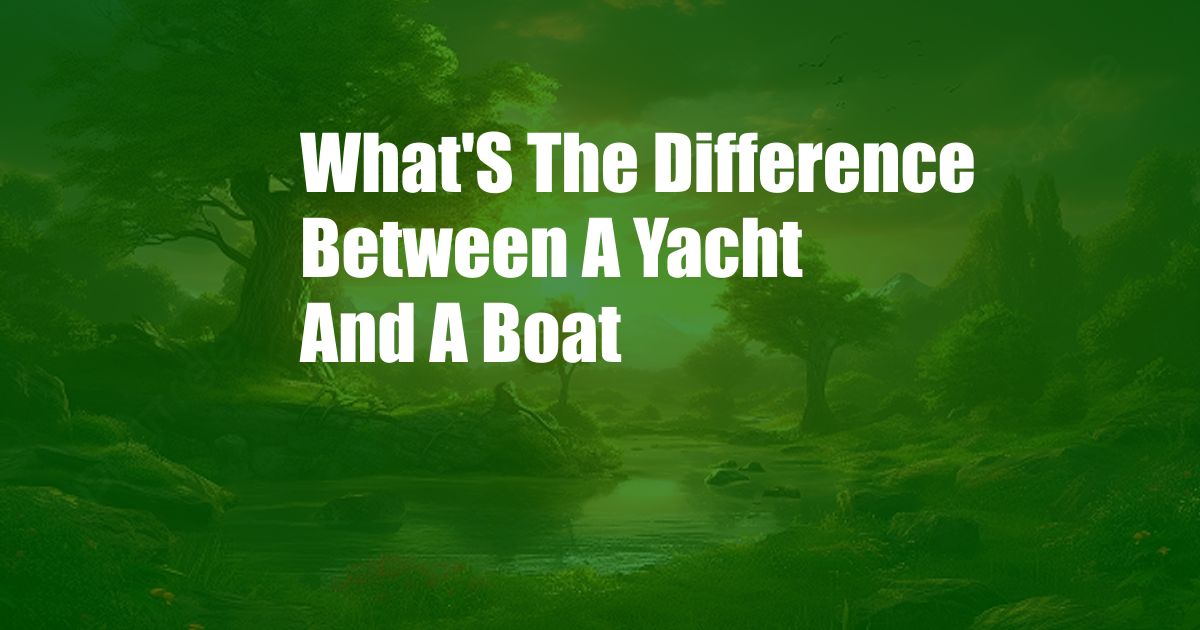
Yacht vs Boat: Distinguishing Between Maritime Beauties
In the captivating world of maritime vessels, the terms “yacht” and “boat” often evoke images of luxury and leisure. However, beyond these superficial similarities, discerning enthusiasts recognize the distinct characteristics that set these two categories apart. Join us on a riveting journey as we delve into the depths of their differences, exploring their definitions, origins, and the nuances that define them.
A Glimpse into the Realm of Yachts and Boats
In the realm of maritime vessels, a yacht stands out as a luxurious pleasure craft designed primarily for recreational purposes. These opulent vessels often exude an air of sophistication, boasting spacious decks, lavish cabins, and amenities that rival those of a fine hotel. Their sleek lines and elegant silhouettes make them a captivating sight on the water.
On the other hand, the term “boat” encompasses a much broader range of vessels, serving diverse purposes from transportation to fishing, racing, and recreation. Boats come in various sizes, shapes, and designs, tailored to meet specific needs and preferences. While some boats share similarities with yachts in terms of comfort and amenities, others prioritize functionality and affordability.
The Evolution of Maritime Terminology
The distinction between yachts and boats has evolved over centuries, influenced by shifting social norms, technological advancements, and changing perceptions of luxury. The term “yacht” is believed to have originated from the Dutch word “jacht,” meaning “hunt,” as these vessels were initially used for pursuing pirates and smugglers. Over time, yachts evolved into symbols of wealth and leisure, becoming the preferred vessels for the elite to indulge in their maritime adventures.
In contrast, the word “boat” has a more utilitarian connotation, encompassing a wide range of vessels used for practical purposes. Boats have played a vital role in human history, serving as means of transportation, commerce, exploration, and warfare. From ancient canoes to modern fishing boats, the term “boat” encompasses the vast diversity of watercraft that have shaped our relationship with the sea.
Unveiling the Defining Characteristics
Beyond their distinct origins and purposes, several key characteristics differentiate yachts from boats:
Size and Scale: Yachts generally measure over 30 feet in length, while boats typically range from small dinghies to large fishing vessels. This difference in size reflects the varying degrees of space, comfort, and amenities offered by these vessels.
Luxury and Comfort: Yachts prioritize luxury and comfort, featuring spacious living quarters, well-equipped kitchens, and entertainment systems. They are often equipped with amenities such as hot tubs, sun decks, and even swimming pools. Boats, on the other hand, typically emphasize functionality, with a focus on performance or utility.
Purpose and Usage: Yachts are designed exclusively for recreational purposes, while boats serve a wider range of functions, including transportation, fishing, racing, and work. This difference in purpose shapes the design, features, and capabilities of these vessels.
Cost and Ownership: Yachts are significantly more expensive to purchase and maintain than boats. Their luxurious amenities, complex systems, and crew requirements contribute to their higher operating costs. Boats, on the other hand, offer a more accessible option for those seeking to enjoy time on the water.
Exploring Modern Trends and Innovations
The worlds of yachts and boats are constantly evolving, driven by technological advancements and changing lifestyle preferences. In recent years, we have witnessed the emergence of new trends and innovations that are redefining the maritime landscape:
Eco-Friendly Technologies: Both the yacht and boat industries are embracing sustainable practices, incorporating hybrid and electric propulsion systems to reduce emissions and protect the marine environment.